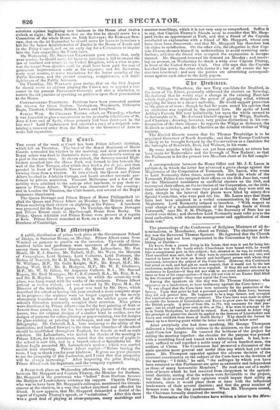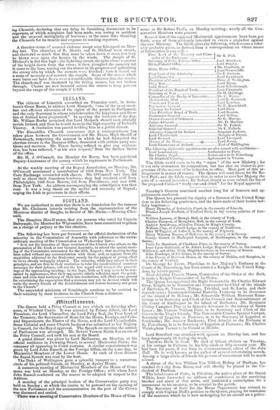Zbe Vrobintes.
Mr. William Wilberforce, the new Tory candidate for Bradford, in the room of Mr. Lister, personally addressed the electors on Saturday. He declared that he would urge a change in the existing Poor-law which shall give to Guardians the power of granting relief, without applying for leave to a distant authority. He would support protection to the grower of corn ; though he had for years stated his opinion that an alteration was required in the present laws. He spoke of Lord Ashley's Factory Bill very indistinctly, but upon the whole seemed to be favourable to it. He declared himself opposed to Whigs, Radicals, and Chartists; drawing, however, very precise distinctions in his con- demnation of the three classes : he regards the Whigs as dishonest, the Radicals as mistaken, and the Chartists as the deluded victims of Whig roguery.
The Kentish Gazette asserts that Sir Thomas Tronbridge is to be appointed Governor of South Australia ; and that Sir George Cockburn is likely to be brought forward by the Conservatives as a candidate for the boroughs of Sandwich, Deal, and Weimer, in his room.
By some mistake which has not yet been explained, no return has been made for Radnorshire and the borough of New Radnor ; so that the Parliament is for the present two Members short of its full comple- ment.
A correspondence between the Home Office and Mr. J. E. Lacon is published, in which the latter has advanced a grave charge against the Magistrates of the Corporation of Yarmouth. Mr. Lacon, who wrote to Lord Normanby three times, asserts that nearly the whole of the Yarmouth Police-force resigned their offices on the 28th June last, voted for the Ministerial candidates as unofficial electors on the 29th, and reaccepted their offices, on the invitation of the Corporation, on the 30th s their salaries being at the same time paid as though they were still on duty, though in the interval their places were filled by ninety-five Special Constables, who were paid 38L 10s. Mr, Lacon says that these facts had been admitted in a verbal communication, by the Chief Magistrate. Lord Normanby refused to interfere. " With respect to- your charge of a maleadministration of the borough funds at Great Yarmouth, says Mr. S. M. Phillipps, "the Secretary of State has no control over them ; and therefore Lord Normanby must refer you to the local authorities, with whom the management and application of those funds rest."
The proceedings of the Conference of Religious Ministers of all de- nominations, at Manchester, closed on Friday. The chairman of the day was the Reverend Thomas Spencer. He regretted that the Church of England had not been represented in the Convention by the Arch- bishop of Dublin— He knew, from a person living in his house, that were it not for being fet- tered as he was by the bonds which Churchmen were bound with, he would take a conspicuous part in this subject ; but, situated as be was, be could not. That excellent man said, that if they were in conversation with any one, and wanted to know if he were an honest and intelligent person with whom they conversed, introduce the subject of the Corn-laws. However, this Conference had acted so well, and bad got so much respect, that it would not be the last conference, unless the Corn-laws were repealed. If they did not wish to see a conference in London—if they did not wish to see every minister attended by three or four of his congregation—if they did not wish to see Exeter Hall filled by five thousand people—they must repeal the Corn-laws. Among the speakers on this day was Mr. Thomas Gisborne ; who appeared as a landowner, to bear testimony against the Corn-laws- It was alleged that the Corn-laws were necessary for the protection of the farmer. Upon that point he had a personal quarrel with those laws; because they did not protect him. He happened to be a large farmer, and occupied five hundred acres at the present moment. The Corn-laws were made in order to enable the farmers of Lincolnshire and Essex to grow corn for the supply of the British people. A price of from 50s. to 70e. was necessary for that pur- pose: but he could not grow corn at 60s. or 700.; if he were to attempt to do so in North Derbyshire, he should be ruined. Now, he wanted to know why the principle of protection should be applied to the farmers of Lincolnshire and Essex and withheld from those of North Derby ? Why should the former be raised up to a thawing-point whilst the latter were left just below zero?
After everybody else had done speaking, Mr. George Thompson delivered a long valedictory address to the ministers, on the part of the Anti-Corn-law League. He vaunted the boldness of the project for calling the meeting together : the circular for the purpose was penned with a trembling hand and issued with a faltering heart. It had, how- ever, sufficed to call together a noble army of seven hundred men, the soldiers of Christ. The Conference had promoted a discussion of the main question more general and useful than any which had yet taken place. Mr. Thompson appealed against the adverse decision of the electoral constitueney on the subject of the Corn-laws to the decision of the meeting : " I think," he said, " the suffrages by which. you have been returned to this Parliament are quite as extensive and independent as those of many honourable Members." He read one out of a multi- tude of letters which he had received from clergymen in the agricul- tural districts, stating that the writers were favourable to the project, but that their avowal of their opinions would impair their utility as ministers, since it would place them at issue with the influential landowners of their several districts ; and that the great number of farmers were in the like predicament. When Mr. Thompson ceased, the Chairman formally dissolved the meeting.
The Secretaries of the Conference have 'written a letter to the Morn- ing Chronicle, declaring that any delay in furnishing documents to its reporters, of which complaint had been made, was owing to accident and the unusual multiplicity of business ; at the same time thanking the Chronicle for its trouble and expense in sending reporters.
A thunder-storm of unusual violence swept over Liverpool on Mon- day last. The churches of St. Martin and St. Michael were struck, and shattered so much that they must be taken down at once, lest they be blown over upon the houses by the winds. The steeple of St. Michael's is 201 feet high : the lightning struck the spire about a quarter of the height down from the cross ; it then ploughed the masonry till it came to the base, tearing out the stones in its progress and splintering the strong ribs by which the corners were finished : here it rooted out a mass of masonry and entered the steeple. Some of the stones which were burst out have flown over a considerable distance into the streets. The church-roof was shattered by the falling masses, but not broken through. Chains are now fastened across the streets to keep persons beyond the range of the steeple if it fall.



























 Previous page
Previous page